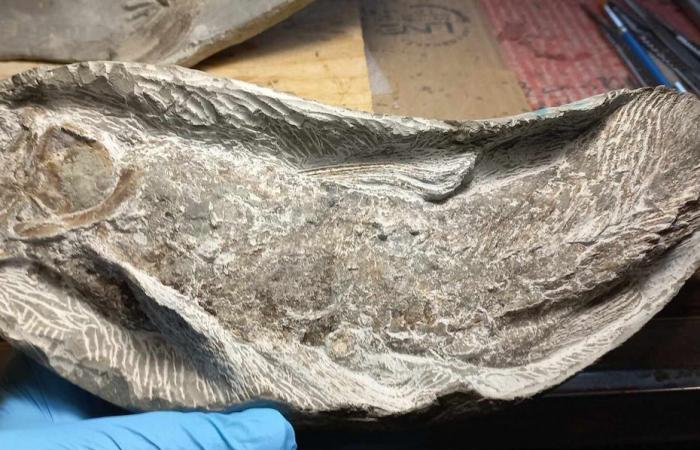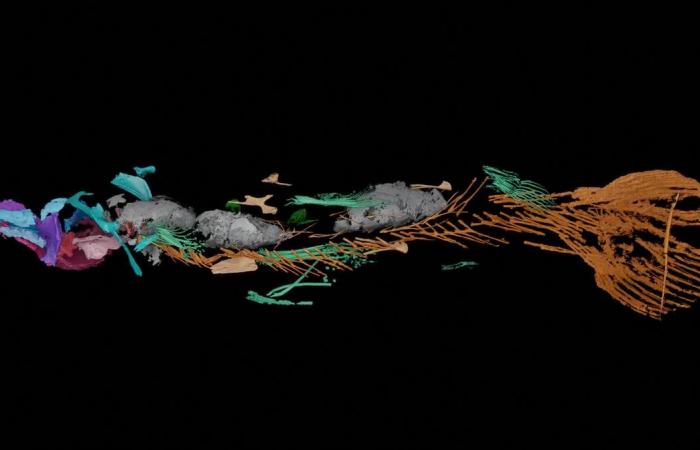Two fossil hunters have discovered a new species of coelacanth fish dating back 240 million years in the Moselle. Good fishing confirmed by Swiss researchers. The specimen was named “Graulia branchiodonta”, in homage to the legendary dragon of Lorraine.
The essentials of the day: our exclusive selection
Every day, our editorial team reserves the best regional news for you. A selection just for you, to stay in touch with your regions.
France Télévisions uses your email address to send you the newsletter “The essentials of the day: our exclusive selection”. You can unsubscribe at any time via the link at the bottom of this newsletter. Our privacy policy
The place is well known to these two fossil enthusiasts. “Somewhere in Moselle, near Sarrebourg” simply answers Jean-Philippe Blouet, a paleontologist from Nancy. “With my brother, François-Xavier, we were on a sort of expedition along a road. We rather expected to find shells, or even small shark teeth, but not such a fish and even less a new species“.
Representation of Graulia branchiodonta. The coelacanth species lived 240 million years ago.
•
© Alain Bénéteau
That day, several specimens of coelacanth, the mythical fossil fish, measuring around fifteen centimeters long, were even discovered by these two enthusiasts from Lorraine. “We just knew that in these places, there was a stratum which is favorable for the preservation of fossil fish” confides the paleontologist, “the bottom of the sea was clayey, not very agitated and these fish fell into it like mud if you like. They were not moved by the currents. There were therefore favorable conditions for their preservation and fossilization.“
Jean-Philippe Blouet, fossil hunter, at work.
•
© DR
Nothing to do, however, with a miracle catch. “We found them all as we searched, they were not in a group, next to each other“. This discovery is all the moreexceptional“that it is a new species of Coelacanth, 240 million years old.”Coelacanths are always very rare and then this one, we could see by its face that it was not in our books. It's also remarkable because it's not every day that you find a fish like this in Lorraine, unlike fossilized shells.”
It's like we've discovered a sample of this evolutionary history
Jean-Philippe Blouet, paleontologist
The coelacanth, sometimes referred to as a sea dinosaur, is considered a mythical fish. “This is called a living fossil.” explains Jean-Philippe Blouet, “you should know that it has existed on earth for 400 million years. Two modern species have even been found in the Indian and Pacific Oceans. And if you compare them to a fish today, it's copy and paste. They have thick, fleshy fins and they have a lung. It is a family which is linked to the first fish which came out of the water to colonize dry land and give rise to all the tetrapods, therefore all the animals with legs. It's as if we've discovered a sample of this evolutionary history. This is a rather exceptional case of nature“.
A confirmation thanks to powerful x-rays
Thanks to a particle accelerator, a scientific team has confirmed the flair of Jean-Philippe Blouet: the revelation ofa new extinct species of coelacanths. “A team from the Natural History Museum (MHNG) and the University of Geneva (UNIGE) has managed to identify an additional species, with a level of detail never before achieved” explains the Swiss museum, in a press release, “this discovery was made possible by the use of the European Synchrotron in Grenoble, a particle accelerator allowing the analysis of matter“. This work and the images obtained can be discovered in the journal PlosOne. “The synchrotron made it possible to have the details of the skeleton and the fossilized lung inside“.
duration of the video: 00h00mn25s
Reconstruction of one of the coelacanths discovered in Moselle.
•
©MHNG-UniGe-ESRF
“We donated two specimens to the Geneva Museum” adds Jean-Philippe Blouet, “the museum is currently under construction but it will perhaps be highlighted in the next exhibition. The others we kept with my brother. In the world, there are less than ten. We can say that it is even rarer than a tyrex.“
This new species was named “Graulia branchiodonta, in homage to the legendary dragon of the Moselle. After all, this is where we found him. And it suits his name well, right?“.







